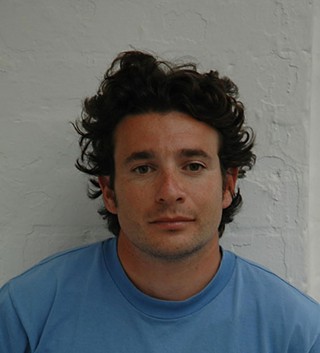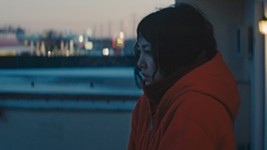The Confidence Game
In Bart Layton's slippery documentary 'The Imposter,' it's a battle between dupe or be duped
By Dan Solomon, Fri., Aug. 17, 2012

When Bart Layton's The Imposter played at the South by Southwest Film Festival last spring, it got a lot of people talking. The film is a close-to-home documentary about a San Antonio family who learns that their missing 13-year-old son, Nicholas Barclay, had somehow turned up in Spain three years later – except the person who returns to Texas with them is actually serial imposter Frédéric Bourdin, a 23-year-old brown-eyed Frenchman who bore little resemblance to the blue-eyed, towheaded boy who went missing years earlier.
Layton's film explores the suspicious reasons the Barclays may have taken the imposter into their home through conversations with the family, extended interviews with Bourdin, and – controversially – through a number of Unsolved Mysteries-style re-enactments. With a film so interested in exploring deception – whether it's Bourdin's impersonations or the Barclay family's self-deception – there are opportunities for the filmmaker to serve as a manipulator, too. We talked to Layton about walking the line between making a film about unreliable people and being an unreliable storyteller himself.
Austin Chronicle: How did you get the Barclay family to participate?
Bart Layton: They were initially hesitant, as you can imagine. But all I was asking for was for them to tell their story in their own words, and I think that was something they hadn't really had the opportunity to do before. I think, ultimately, that was the overriding feeling, and now, having seen the film, I think they're glad they did.
AC: So they're happy with how they're portrayed in the film?
BL: What they said when we showed them the film on the way to Sundance was that it was fair and an honest portrayal of their experience.
AC: I'm surprised, because I came out of it with a really negative impression of them.
BL: I've heard people who come out feeling very negative about them, but there are an equal number who feel that they're the consummate victims, and they ultimately were blinded by their need to believe something that they desperately wanted to be true. If the press is anything to go by, the overriding feeling by the critics is that their greatest crime was that they were incredibly gullible and naive. That's one of the questions that the film raises, and everyone comes away with their own thoughts about that.
AC: As you got to know them, did your opinion change on what really happened?
BL: My opinions were changing constantly. That's one of the things I felt was a key to how the film should be approached – it wasn't a straightforward experience. I would go from one interview one day with what I thought was a very clear idea of what had happened, and then I'd do another interview with someone else the next day, and I would come away with almost the diametrically opposite conclusion. That was quite a bewildering experience, and it was obvious to me that there wasn't going to be a neat, objective truth. What was interesting, and what the story, I think, became, was this idea that you've got different subjective, and often conflicting, versions of the truth. And how do you present all of those versions? I wanted to create a structure to the film that reflected the journey that I went on in making the film. Just as one truth starts to come clear, another one replaces it.
AC: Did the re-enactments help create that confusion in the audience?
BL: That wasn't the intention. I think the enactments serve various different purposes. I haven't found quite the right term for them, either, because I'm not sure that reconstructions or re-enactments is the right term. It's a natural term to use, but it implies that there's a forensic reconstruction of events. What I wanted to do was continue the idea that what you're seeing is a subjective account. That they're an extension of the story you're being told by this person. I didn't want the audience to think it was archive footage, or some kind of fake reality that we're trying to persuade you is the truth. That's when re-enactment in documentary can be particularly problematic. What I wanted to do is convey to you that what you're watching isn't what must have happened, it's what this person wants you to believe. If a great storyteller tells you a story, you have a visual experience – a kind of movie that plays in your head. It was that which I wanted to recreate.
AC: Was Frédéric involved in creating the enactments? On some level, we're watching what you want us to believe, not Frédéric.
BL: He wasn't aware or involved in any way, other than providing the story and the memories that became the detail of what you see. The movie that was playing in my head about what that looked and felt like is what I was trying to re-create. He wasn't involved with that on any level – his involvement ended with the interview.
AC: Some of the footage of him during the interview, where he's smirking at the camera like he's gloating, is juxtaposed with the quotes from the Barclays or the enactment footage, and it's hard to know what he's really responding to.
BL: Those moments are really his response to the story that he's telling or the questions that he's being asked to reflect upon. What you see are these very different aspects to his character. This idea of wanting to put the audience in some ways inside the story, on the receiving end of him as a storyteller and an individual. When you spend time with him, it's not black and white. There were certainly times when I felt quite charmed by him, and very sorry for him, and sympathetic. Then there were other times when I felt like he was completely despicable, really, and I wanted you as an audience member to have some of that experience. The interaction with him is complicated – you do find him captivating at times, and charming, and he tells you the story of his childhood and invites sympathy. But you know that this guy is really an unreliable witness. You're not sure that you can trust anything he says. Those are the things I thought it was important for the audience to experience firsthand, rather than through a thesis film, where you've made a judgment on him before he's even opened his mouth.
AC: When you're making a film about a manipulator, do you end up manipulating the audience yourself, as a filmmaker?
BL: My answer would be yes, ultimately. You're almost looking down a microscope at a group of human beings that you can't relate to on any level, and you can't understand how this extraordinary situation could have happened. And we could get into a really endless conversation about what "documentary" should mean [laughs], but to me, one of the interesting things was – could you, as an audience member, be manipulated by the con artist? And then you suddenly get a very different understanding of how the authorities and the family could have the wool pulled over their eyes. The moment when you start understanding the logic of what he did – the story he tells, which is, "I had my childhood stolen away from me, and I was justified in stealing one back" – the moment you start to understand that on some level, then you've probably fallen for it. [Laughs] It goes back to the idea of, "Can you allow the audience to experience something of that, as well?" And then put the audience inside the story, rather than looking through a magnifying glass at these unrelatable characters. I thought that would be a much more interesting film to make.
AC: How do you balance telling a story about unreliable people with the need to not make an unreliable film?
BL: You allow them all to tell the story that they want you to hear, and you present it in as balanced a way as you possibly can, and let them all respond to the things that are in there. The critical thing is that you're being very straight with the audience in terms of putting them in the position to make their minds up as to what happened. The audience has got most of the information. It becomes up to us to make sense of it, and navigate it in some way.
The Imposter opens in Austin this Friday. See Film Listings for showtimes and review.











